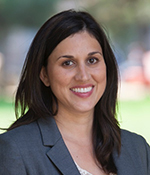
Neeta Thakur, MD, MPH, an assistant professor at the University of California, San Francisco School of Medicine, is driven to understand the social determinants of health and compelled to make a difference in communities of those affected. In 2014, Dr. Thakur received an ATS Foundation Recognition Award for Outstanding Early Career Investigators, and today her research on the stress biomarkers of asthma comorbidity, as they relate to poverty, has expanded.
The award from the American Thoracic Society afforded Dr. Thakur with dedicated time for research and opened doors for future funding, including funding from the Department of Defense to study how social adversity affects immune and neuroendocrine response. This research focuses on African American and Latino children with asthma, and her research team plans to examine microbiome in relationship to poverty. The award also provided pilot funding for the data used in her National Institute of Health application. The larger-scale K23 grant is now awaiting final determination from the NIH funding council.
Her latest research involves adverse childhood experiences (ACEs). Working in Bay Area neighborhoods grappling with high rates of asthma and community violence, Dr. Thakur and partners at the Center for Youth Wellness and UCSF Benioff Children’s Hospital in Oakland, California, hope to develop ACEs screening tools and design interventions. This project also aims to shed light on how ACEs contribute to poor health, as the biological pathways of traumatic stress are not well understood.
“Poverty gets under your skin,” Dr. Thakur says. “And adverse childhood experiences impact health.”
On a typical week, Dr. Thakur can be found in the Asthma Collaboratory, a research laboratory of Esteban G. Burchard, MD, MPH, who is considered a pioneer in the genetics of asthma in minority populations, and with whom Thakur has collaborated since her second year of fellowship at UCSF. She divides her attention between analysis, reading, writing, and regular meetings with research collaborators and mentors. She practices medicine one morning or afternoon a week, which she says helps to ground her research.
She notes that a lot of what physicians and clinical providers can do is limited, and more and more relies on being able to connect with case managers, legal groups, school workers, community leaders, and others.
In a recent case, Dr. Thakur, worked jointly with the San Francisco General Hospital HOT Team, an outreach program, to help a patient who suffered from COPD. He was without access to medications and endured repeat exacerbations from walking long distances because the shelter system he depended on forced him outside every day, and he required oral steroids. Dr. Thakur and her colleagues were able to secure more permanent housing for the patient, and as a result, he was able to stop taking oral steroids and has not been hospitalized in over a year.
“Everything we learn in medical school is irrelevant if someone leaves your office and heads back to sleep on the street,” Dr. Thakur says, quoting one of her colleagues and role models, Margot Kushel, MD, a UCSF professor of medicine and researcher.
Update: In 2016, Dr. Thakur received a K23 Career Development Award for her patient-oriented research on asthma and social adversity. She is also the current chair of the ATS Health Equality and Diversity Committee



